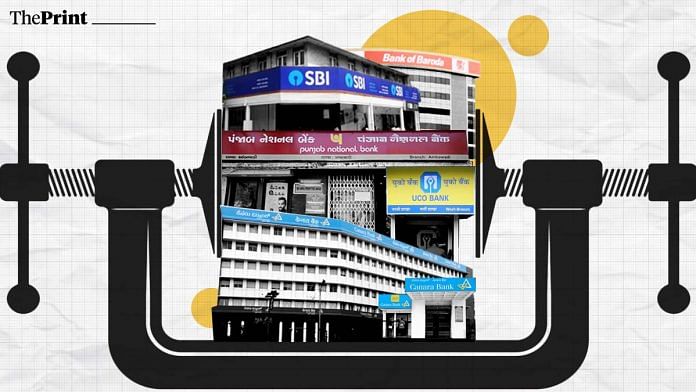The government has done a commendable job on financial inclusion, of that there is no doubt. But now it has to ensure that all these newly-banked customers don’t face harassment at the hands of the lenders or face disincentives to actually operating their accounts. Going by news reports and anecdotal evidence, the disincentives are pretty significant at the moment.
According to data available on the website of the Pradhan Mantri Jan Dhan Yojana—the government’s flagship financial inclusion scheme—nearly 48 crore accounts have been opened under the initiative, with a balance of Rs 1.8 lakh crore between them. Opening these accounts and transferring funds into them is one thing; encouraging the account holders to use them is another.
One of the key issues seems to be the opacity of the rules. Over the last few years, the government has merged several public sector banks (PSBs) to improve their profitability and operational efficiency, a move that is yielding results. However, what also seems to have happened is that users have not been informed about the complications these mergers have caused.
Also read: RBI puts 3 options on table for cryptos — regulate, ban or ‘let them implode’
New rules, new problems
Suppose a person has a Jan Dhan Yojana account in Union Bank of India and later opens a salary account in Corporation Bank. Now that the two banks have been merged, that user has two accounts with the same bank–something the Reserve Bank of India says is not allowed.
According to the RBI’s rules, “holders of Basic Savings Bank Deposit Account will not be eligible for opening any other savings account in that bank. If a customer has any other existing savings account in that bank, he/she will be required to close it within 30 days from the date of opening a Basic Savings Bank Deposit Account”.
This would be fine as long as the user is informed. The problem is that many are not being told. Customers find out that they have two accounts in the same bank only when they go to their branch to conduct some other transaction. They are then told to close their salary account (where they get their regular income) or their PMJDY account (where the government transfers whatever subsidy it gives).
How do they choose? More importantly, why must they? The government should have figured out these knock-on effects before they merged the banks. Now that the merger is done, the government should at least ensure that another account is opened in a different bank, at no cost to the customer.
The issues with the PMJDY accounts don’t end there. According to the rules, PMJDY accounts can have zero balances and don’t incur penalties. However, some news reports say that users are being charged a penalty for conducting more than four monthly debits.
In the age of UPI (Unified Payments Interface) transactions, users of PMJDY accounts are finding out—to their considerable dismay—that the bulk of their balance has been eaten up due to usage charges on the numerous small UPI transactions they conduct each month. This hurts doubly for those users who didn’t go in search of a bank account but had one created for them during the PMJDY drives.
Perhaps this is why about a fifth of the PMJDY accounts are inoperative due to lack of use or why 4.44 crore account holders did not renew their PMJDY RuPay debit cards.
The banks deny levying any charges, but enough people complain that their money is deducted when it shouldn’t be. The first step is making the rules very clear. It is unfair to expect the newly banked to be savvy enough to find out all the rules for themselves.
Apart from burdening those at the bottom of the pyramid, there is another way that banks are harassing customers: KYC (Know Your Customer) norms for locker services. In August 2021, the RBI issued a new set of rules governing locker services offered by banks. Among these rules was one that specified that “at the time of allotment of the locker to a customer, the bank shall enter into an agreement with the customer to whom the locker facility is provided, on a paper duly stamped.”
But what happens to those who already have locker services with banks? They are denied access to their lockers unless they return with an agreement on stamped paper. Moreover, there doesn’t seem to be any consensus on what the value of this stamp paper should be. News reports show that branches of the same bank located in different states ask for different values of stamp paper.
Also read: RBI report shows banks’ health improving, but write-offs are rising too
RBI standardisation a must
The RBI needs to come up with a standard and communicate it far and wide. People can’t be denied their valuables because of a lack of operational clarity post merger. Such moves create aversion to banking services, which in turn creates an incentive to keep cash and valuables at home—the first step in a very slippery slope toward black money hoarding.
All of this, of course, is not counting the deluge of spam calls and messages banks and their representatives send customers asking whether they would like credit cards or loans. “Hello, you have been pre-approved for…” is an all-too-common message one hears when answering a call from an unknown number. That, too, needs to stop.
Banking is an integral sector, and improving financial inclusion among the unbanked is an essential function that public sector banks play. Understandably, they don’t want to do this for free, but either way, it is not PMJDY customers who should pay; it is the government that must. In addition, improving customer-awareness initiatives and ceasing the spam will show that the banking sector has truly come of age.
Views are personal.
(Edited by Zoya Bhatti



